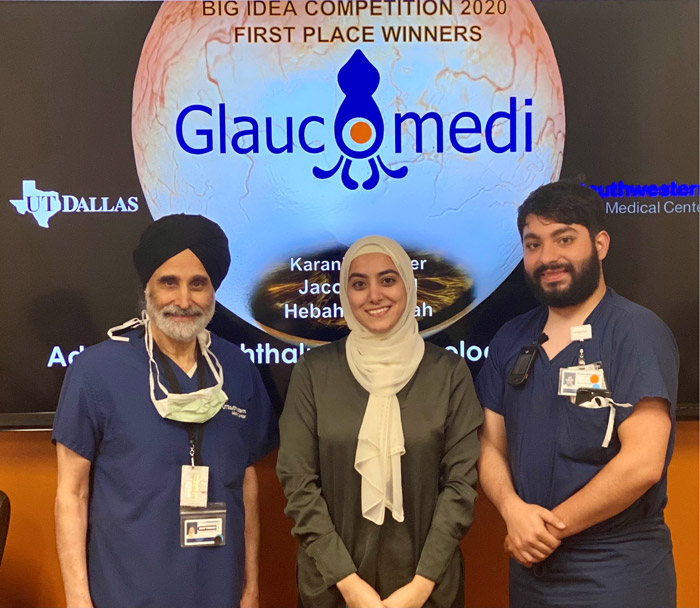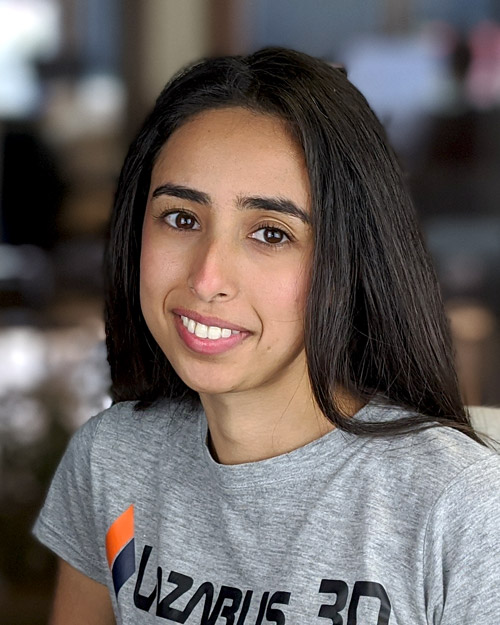
The annual Big Idea Competition, the premier entrepreneurial pitch contest at The University of Texas at Dallas, expanded in scope for its 2020 event, with more prize money, more categories and more competitors than in previous years.
The event, held in a virtual format Nov. 19 as part of Global Entrepreneurship Week and the Texas Startups Roadshow, welcomed a new partner and new sponsors, and featured a keynote address by entrepreneur and Dallas Mavericks owner Mark Cuban.
Presented by the Institute for Innovation and Entrepreneurship (IIE) at UT Dallas, the expanded “Shark Tank”-style competition exemplified the growing role of the University in transforming the North Texas region into a national hub of entrepreneurship and corporate innovation.
Prize money increased from $40,000 last year to more than $200,000 this year. The previously student-centric affair also added new tracks for alumni and research commercialization, as well as contestants from new competition partner UT Southwestern Medical Center.
The competition sponsors were Lyda Hill Philanthropies, Capital Factory, Stacey and Chuck Butler of Palomino Capital LLC, Silicon Valley Bank, Zelaya Productions and Blackstone LaunchPad powered by Techstars. RA Session II, president, CEO and co-founder of Taysha Gene Therapies, served as the event’s host and master of ceremonies.

“Just as IIE, the research and the academic programs at UT Dallas are maturing to new levels, the Big Idea Competition has been growing to shine a public spotlight and encourage the ambitions of the University.”
Paul Nichols, executive director of the Institute for Innovation and Entrepreneurship at UT Dallas
Paul Nichols, IIE’s executive director and director of innovation and entrepreneurship programs in the Naveen Jindal School of Management, said the UT Southwestern Biotech+ Track was one way to highlight a growing relationship between the two UT System institutions.
“We started talking, even pre-COVID, about bringing UT Southwestern on as a partner,” Nichols said. “They have ambitious plans for the region and see UT Dallas as a key partner in those efforts.”
Encouraging Entrepreneurial Endeavors on Campus
Nichols said the new Research Commercialization Pitch Track highlighted the vast amount of research taking place at UT Dallas and encourages the growth of new companies.
“UT Dallas is doing more than $130 million of research now,” Nichols said. “We need to help faculty and students transition their great achievements out of the lab and into the world. Acadia Pharmaceuticals recently acquired one of our star startups, CerSci Therapeutics. With all the great work our researchers are doing, we can expect more of that in our future.”
Nichols said the Alumni Pitch Track was added to give entrepreneurial alums a platform to showcase their work. “We want an ongoing relationship with our graduates. That’s why the Venture Development Center is open to alumni, and that’s one of the reasons why we expanded the competition. We’ve grown from being student-centric to encompassing the entire UT Dallas community. Even with this expansion, the students are still getting a strong platform and a great experience going through the Big Idea Competition.”

The enhanced competition is part of a larger entrepreneurial ecosystem at UT Dallas managed by IIE. The Jindal School master’s program that Nichols directs was recently elevated to No. 10 in The Princeton Review’s 2021 rankings of top graduate schools for entrepreneurship.
“Just as IIE, the research and the academic programs at UT Dallas are maturing to new levels, the Big Idea Competition has been growing to shine a public spotlight and encourage the ambitions of the University,” Nichols said.
Keynote speaker Cuban said entrepreneurship is all about “doing something in a way that solves a problem or makes people realize that you’re giving them a product or service that they now know that they need because of you.”
Nichols envisions the entrepreneurial programs at UT Dallas doing what Cuban described — breaking down barriers between schools and even institutions.
“My ideal student team for our course projects and competitions is one business, one engineering, one science, and one arts and design student,” he said. “Imagine 100 teams, each with those four academic backgrounds, coming up with ideas and learning how to work together to develop them into real-world solutions. That’s how you transform a university. That’s how you create a culture. That’s the path that we’re on.”
2020 Big Idea Competition Grand Prize Winners
Student Pitch Track – $25,000
Glaucomedi is a company that is developing a drainage device to treat glaucoma by reducing eye pressure.
Team members: Hebah Abdallah BS’19, biomedical engineering graduate student; Jacob Awkal, biomedical engineering senior; and Dr. Karanjit Kooner, associate professor of ophthalmology at UT Southwestern.
Other finalists were Campus Oven and Reallos.
Alumni Pitch Track – $25,000

Lazarus 3D is a company that creates replicas of patient organs from MRI/CT-scan data out of materials that mimic real-tissue properties, allowing doctors to perform a “dry run” on an exact replica of a patient’s organs prior to an actual procedure.
Team leader: Mouna Taroua BS’17, head of biomedical engineering for Lazarus 3D.
Other finalists were Vigilant Software and Skyven Technologies.
Research Commercialization Pitch Track – $100,000

X-Nerve offers a wireless implantable stimulator to move the tongue to open the airway during sleep.
Team leader: Dr. Robert Rennaker, professor of neuroscience in the School of Behavioral and Brain Sciences and associate director and chief technology officer in the Texas Biomedical Device Center at UT Dallas.
Other finalists were Doloromics and Regulife Medical.
UT Southwestern Biotech+ Track – $50,000

Dr. V. Vinod Mootha, professor of ophthalmology at UT Southwestern, is developing a novel therapy for the prevention and treatment of Fuchs endothelial corneal dystrophy.
The second-place winner received $12,500. Dr. Yang Xie, professor of population and data sciences at UT Southwestern, is developing an artificial intelligence model for digital staining of pathology images to characterize tumor microenvironment and predict patient clinical outcomes.